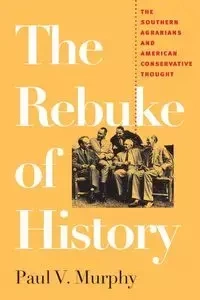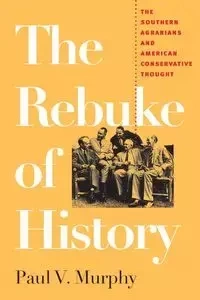The Rebuke of History - Paul V. Murphy
The Rebuke of History - Paul V. Murphy
- The Southern Agrarians and American Conservative Thought
AutorzyPaul V. Murphy
Tracing the Agrarian tradition from its origins in the 1920s through the present day, Murphy shows how what began as a radical conservative movement eventually became, alternately, a critique of twentieth-century American liberalism, a defense of the Western tradition and Christian humanism, and a form of southern traditionalism--which could include a defense of racial segregation. Although Agrarianism failed as a practical reform movement, its intellectual influence was wide-ranging, Murphy says. This influence expanded as Ransom, Tate, and Warren gained reputations as leaders of the New Criticism. More notably, such "neo-Agrarians" as Richard M. Weaver and M. E. Bradford transformed Agrarianism into a form of social and moral traditionalism that has had a significant impact on the emerging conservative movement since World War II.
EAN: 9780807849606
Symbol
105FTJ03527KS
Rok wydania
2001
Oprawa
Miekka
Format
15.6x23.4cm
Język
angielski
Strony
366

Bez ryzyka
14 dni na łatwy zwrot

Szeroki asortyment
ponad milion pozycji

Niskie ceny i rabaty
nawet do 50% każdego dnia
Niepotwierdzona zakupem
Ocena: /5
Symbol
105FTJ03527KS
Kod producenta
9780807849606
Rok wydania
2001
Oprawa
Miekka
Format
15.6x23.4cm
Język
angielski
Strony
366
Autorzy
Paul V. Murphy

In 1930, a group of southern intellectuals led by John Crowe Ransom, Allen Tate, Donald Davidson, and Robert Penn Warren published I'll Take My Stand: The South and the Agrarian Tradition. A stark attack on industrial capitalism and a defiant celebration of southern culture, the book has raised the hackles of critics and provoked passionate defenses from southern loyalists ever since. As Paul Murphy shows, its effects on the evolution of American conservatism have been enduring as well.
Tracing the Agrarian tradition from its origins in the 1920s through the present day, Murphy shows how what began as a radical conservative movement eventually became, alternately, a critique of twentieth-century American liberalism, a defense of the Western tradition and Christian humanism, and a form of southern traditionalism--which could include a defense of racial segregation. Although Agrarianism failed as a practical reform movement, its intellectual influence was wide-ranging, Murphy says. This influence expanded as Ransom, Tate, and Warren gained reputations as leaders of the New Criticism. More notably, such "neo-Agrarians" as Richard M. Weaver and M. E. Bradford transformed Agrarianism into a form of social and moral traditionalism that has had a significant impact on the emerging conservative movement since World War II.
EAN: 9780807849606
Tracing the Agrarian tradition from its origins in the 1920s through the present day, Murphy shows how what began as a radical conservative movement eventually became, alternately, a critique of twentieth-century American liberalism, a defense of the Western tradition and Christian humanism, and a form of southern traditionalism--which could include a defense of racial segregation. Although Agrarianism failed as a practical reform movement, its intellectual influence was wide-ranging, Murphy says. This influence expanded as Ransom, Tate, and Warren gained reputations as leaders of the New Criticism. More notably, such "neo-Agrarians" as Richard M. Weaver and M. E. Bradford transformed Agrarianism into a form of social and moral traditionalism that has had a significant impact on the emerging conservative movement since World War II.
EAN: 9780807849606
Niepotwierdzona zakupem
Ocena: /5
Zapytaj o produkt
Niepotwierdzona zakupem
Ocena: /5
Napisz swoją opinię

